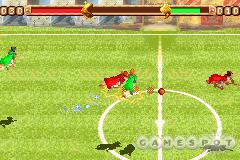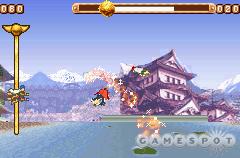Millions of people these days want to eat, sleep, and breathe the world of Harry Potter. They'll stand in line for hours just to get the books on release day. Children will watch the movies over and over again on DVD until the discs are too scratched to play. And everyone from age two to age 52 is putting on wizard hats and oversized glasses and walking around quoting phrases like "Wingardium Leviosa." What all of these generations have in common is the desire to buy, bargain, or borrow just about anything with Harry's likeness on it. Unfortunately, that's the only good reason for adding Harry Potter: Quidditch World Cup to your GBA game collection, because while EA has done an OK job of turning quidditch into a video game, the sport itself doesn't have enough depth to it to headline a stand-alone product.

Quidditch is basically a variation of soccer played on flying broomsticks. Each team is composed of seven players, who are broken down into strikers/midfielders, defenders, and goalies--only in this game, they're called chasers, beaters, and keepers. The point of the game is to have one of your chasers take the ball, which is called a quaffle, and throw it into one of the three hoops on the opposing team's side of the field. The fielders on the opposing team can try and tackle you with special moves, or they can call in one of their beaters to throw you off of your broom by hitting you with what's called a bludger--a living ball that wanders the field for the sole purpose of being whacked into the players. Each score is worth 10 points. At the end of the match, one player from each team is chosen to chase a birdlike creature called a snitch. Whichever player captures the snitch earns 150 additional points for their team. That's quidditch in a nutshell, and while it may sound bizarre, it actually makes a lot of sense in the British-tinted universe of the Harry Potter books.
EA Games did a nice job of bringing quidditch to life on the GBA. For most of the match, you're moving your chasers up and down the field and trying to chain together passes to fill your power bar at the top of the screen. This power bar allows you to perform special tackles and shots that pretty much guarantee your control over the ball. Once the power bars for both teams collide, the golden snitch flies onto the field and the perspective moves behind one of your players. This is called seeker mode, and your goal here is to catch the snitch before you run out of boost. To keep your boost bar filled, you need to grab the blue orbs that pass by at regular intervals. The more orbs you miss, the greater the odds that your opponent will overtake you and claim the snitch for his team.
Historically, Harry Potter games on the GBA haven't pushed the envelope with respect to graphics or audio. Quidditch World Cup continues the trend by dishing out a serviceable yet unspectacular presentation. The field is shown from the side, in a perspective similar to that of old 16-bit football games. Quidditch World Cup looks much prettier than the Joe Montanas and 10-Yard Fights of yesteryear, however. The fields are photorealistic and the characters exhibit a great deal of movement for all of their various passes, flips, and tosses. What the developers neglected to do was add some movement to the stands or gussy up the character graphics in some way to show facial reactions or fatigue. Even though the graphics are clear and crisp, they don't have any oomph to them. The game's soundtrack picks up some of the slack, though. Digitally sampled sound effects are employed for things like tackles and scoring, and the music is taken directly from the previous two movies without sacrificing much in the way of quality.
The game's biggest problem is that quidditch itself is a simple and unbalanced sport. The only strategy during the field portion of the match involves dodging opponents when you have the quaffle and taking it away from them when you don't. Nonetheless, no matter how well or how poorly you do during most of the match, the entire outcome is decided by the snitch portion at the end. Imagine if at the end of an NFL football game, a team could execute a play that would score 15 touchdowns at one time. That would eliminate all of the suspense and thrills from 59 of the 60 minutes in regulation play, thus effectively rendering football a joke. That's what the snitch does to quidditch.

Most players, regardless of age, will blow through the single-player options in Quidditch World Cup rather quickly. The game features the usual set of practice, exhibition, and tournament modes, and it gives you a dozen different teams to pick from--including the four Hogwart's houses: Gryffindor, Slytherin, Hufflepuff, and Ravenclaw. The journey from the initial practice match to the final tournament cup takes approximately one hour. No kidding. Your reward for playing through all of these modes is a set of 105 different quidditch cards, which unlock additional teams, special moves, and multiple difficulty settings. Like many of the other GBA games that are hitting the shelves these days, Quidditch World Cup supports GameCube connectivity and link play for up to two players. Using the connectivity cable, you can trade quidditch cards with the game's GameCube counterpart.
Harry Potter fans who feel that they absolutely must own everything Harry Potter will get at least some enjoyment out of Harry Potter: Quidditch World Cup. Those of you who actually want a decent sports game should look elsewhere.